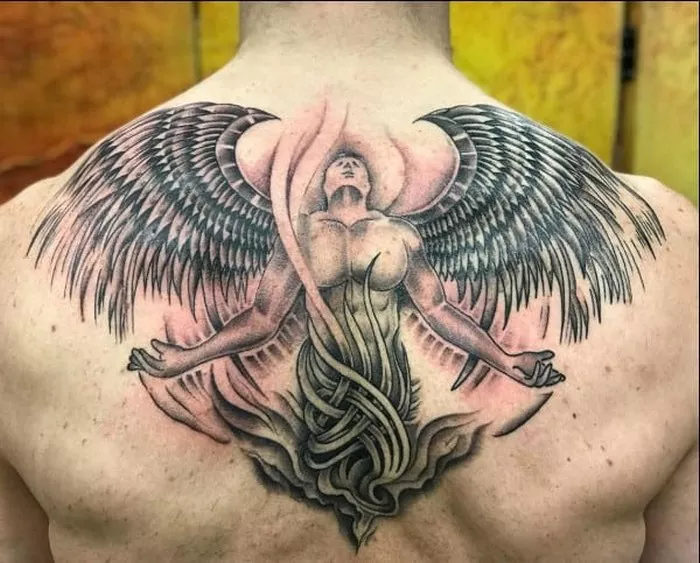In the realm of body art, tattoos serve as more than just decorative ink etched into the skin; they often carry profound symbolism and personal significance. Among the myriad of tattoo designs, the guardian angel tattoo stands out as a popular choice, especially among men. Symbolizing protection, guidance, and spiritual connection, the guardian angel tattoo holds deep meaning for those who choose to adorn themselves with this powerful imagery.
Exploring the Origins of Guardian Angels
To truly understand the significance of the guardian angel tattoo, it’s essential to delve into the origins of the concept of guardian angels themselves. Across various cultures and religious traditions, belief in guardian angels has endured for centuries. In Christianity, for example, guardian angels are believed to be celestial beings assigned by a higher power to protect and guide individuals throughout their lives. This belief is rooted in biblical teachings, with references to guardian angels found in passages such as Psalm 91:11, which states, “For he will command his angels concerning you to guard you in all your ways.”
Similarly, the concept of guardian spirits or protective deities exists in other religious and spiritual belief systems, such as Islam, Judaism, and various indigenous traditions. These guardian entities are thought to offer comfort, support, and divine intervention to those in need, serving as benevolent overseers of human affairs.
Symbolism of the Guardian Angel Tattoo
When a man chooses to adorn his body with a guardian angel tattoo, he is imbuing himself with the symbolism and protective qualities associated with these celestial beings. The tattoo serves as a visual representation of his belief in divine guidance and protection, as well as a reminder of the spiritual forces at work in his life.
1. Protection: At its core, the guardian angel tattoo symbolizes protection. Just as guardian angels are believed to watch over and safeguard individuals from harm, the tattoo acts as a talisman, offering a sense of security and reassurance to the wearer. In a world filled with uncertainty and danger, the presence of a guardian angel serves as a comforting reminder that one is never alone.
2. Guidance: In addition to protection, guardian angels are also associated with guidance and direction. They are believed to offer wisdom and insight to those who seek their counsel, helping individuals navigate life’s challenges and make informed decisions. The guardian angel tattoo thus serves as a symbolic compass, guiding the wearer along their journey and providing spiritual guidance along the way.
3. Spiritual Connection: For many men, the guardian angel tattoo represents a deep and personal connection to the divine. It serves as a tangible expression of their faith and spirituality, reminding them of their place within the larger cosmic order. Whether viewed through a religious lens or as a more general belief in higher powers, the guardian angel tattoo fosters a sense of connection to something greater than oneself.
Personal Interpretations and Variations
While the guardian angel tattoo carries universal symbolism, its meaning can vary greatly from person to person. Each individual brings their own unique interpretation and personal significance to the tattoo, resulting in a wide range of stylistic variations and artistic expressions.
1. Memorial Tributes: For some men, the guardian angel tattoo serves as a tribute to a loved one who has passed away. In this context, the tattoo represents not only protection and guidance but also serves as a memorial to the memory of the departed. It becomes a way to keep their spirit alive and honor their presence in the wearer’s life.
2. Life Transitions: Others may choose to get a guardian angel tattoo during times of significant life transitions or personal challenges. Whether embarking on a new chapter, overcoming adversity, or seeking guidance during a period of uncertainty, the tattoo serves as a symbolic anchor, providing strength and support during times of change.
3. Expression of Faith: For men of faith, the guardian angel tattoo is a powerful expression of their religious beliefs. It serves as a outward manifestation of their devotion and serves as a constant reminder of the presence of divine forces in their lives.
4. Artistic Expression: Beyond its spiritual and symbolic meanings, the guardian angel tattoo also holds aesthetic appeal for many men. With its intricate designs and rich symbolism, the tattoo offers ample opportunity for artistic expression and creative interpretation. From realistic portraits of angelic figures to abstract representations of wings and halos, the guardian angel tattoo can be customized to reflect the individual tastes and preferences of the wearer.
Cultural and Historical Significance
The guardian angel tattoo has deep roots in both ancient and contemporary cultures, reflecting humanity’s enduring fascination with the divine and the supernatural. Throughout history, depictions of angels and celestial beings have been found in art, literature, and religious texts, serving as sources of inspiration and spiritual guidance for countless generations.
In modern times, the guardian angel tattoo has emerged as a popular motif within the world of tattoo artistry, embraced by people of all backgrounds and belief systems. Its timeless symbolism and universal appeal have made it a staple of tattoo culture, with variations of the design appearing in tattoo parlors around the world.
Final Thoughts
In a world fraught with uncertainty and challenges, the guardian angel tattoo offers a beacon of hope and protection for men seeking spiritual guidance and divine intervention. Whether viewed as a symbol of faith, a memorial tribute, or a form of artistic expression, the tattoo holds deep personal significance for those who choose to adorn themselves with its imagery. As a visual reminder of the presence of guardian angels in their lives, the tattoo serves as a source of strength, comfort, and inspiration, guiding men along their journey and watching over them with unwavering protection.

